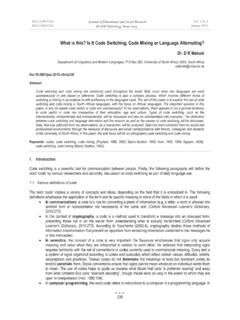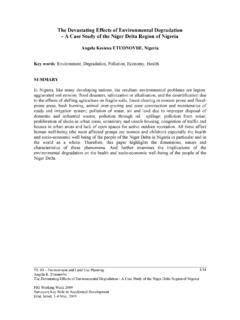Transcription of IN THE HIGH COURT OF SOUTH AFRICA GAUTENG LOCAL …
1 1 IN THE HIGH COURT OF SOUTH AFRICA GAUTENG LOCAL DIVISION, JOHANNESBURG CASE NUMBER: 10831/12 In the matter between: CIRANO INVESTMENTS 307 (PTY) LTD Plaintiff and EXECUJET AVIATION (PTY) LTD Defendant Coram: WEPENER J Heard: 19 MARCH 2014 Delivered: 22 MARCH 2014 DELETE WHICHEVER IS NOT APPLICABLE (1) REPORTABLE: NO (2) OF INTEREST TO OTHER JUDGES: NO (3) REVISED: _____ _____ DATE SIGNATURE 2 Summary: Breach of contract damages claim - general damages rule on mitigation of loss not to be confused with calculation of claim for loss of profit _____ JUDGMENT _____ WEPENER J: [1] The plaintiff seeks damages from the defendant as a result of the defendant s breach or repudiation of a written agreement in terms whereof the defendant leased an aircraft from the plaintiff.
2 [2] The parties agreed, and I ordered, a separation of issues in this matter in that the following question only is to be determined in limine: whether the provisions of clause of the written agreement concluded by the parties, precludes the kind of claim pursued by the plaintiff. [3] The relevant clause provides: The Parties shall be exempt from, and no Party shall be liable under any circumstances for, any indirect, special or consequential damages of any nature, or any loss of profit, loss of ability to make use of the Aircraft or other special damages of any nature which any other Party may suffer, as a result of, relating to, or arising directly or indirectly in any manner whatsoever out of the terms of this Agreement, or grossly negligent or wilful acts or omission of any Party. [4] It is not in dispute that the clause excludes claims for special damages but not general damages.
3 However, the defendant submits that the claim of the plaintiff is couched as a loss of profit, the latter which is prohibited from being recovered from the defendant. [6] Counsel for the defendant did not counter the submission presented on behalf of the plaintiff in relation to the exposition of the law regarding general damages, but submitted that it is not applicable in this matter, as the plaintiff has instituted a claim for loss of profits, which is excluded . 3 [7] The legal position which is not in dispute, but submitted by the defendant not be applicable, is the following: The loss which the innocent party suffers as a result of breach of contract may be either primary or secondary (consequential). The innocent party s primary loss is the value (that is, monetary value) of the performance which he or she was promised less the value of the performance he or she has been excused from rendering (on account of his or her having rescinded the contract).
4 The innocent party s secondary loss is the loss he or she suffered over and above the value of performance not received, for example, interest or profit that he or she failed to earn because the guilty party did not perform as promised. In what follows, damages for secondary or consequential loss are referred to as additional damages. 1 [8] The difference between general damages and special damages has been described by Trollip JA in Shatz Investments (Pty) Ltd v Kalovyrnas2 as follows: According to these particulars plaintiff's claim was not for (a) general damages , but was for (b) special damages . Sometimes the corresponding terms intrinsic and extrinsic damages are used (see Pothier, Obligations, (Evans' translation, paras. 161 and 162), and Whitfield v. Phillips and Another, 1957 (3) SA 318 (AD) at p. 329D - E).
5 I use the former terms here as well known, convenient labels to respectively differentiate, broadly and without any pretence at precision, between (a) those damages that flow naturally and generally from the kind of breach of contract in question and which the law presumes that the parties contemplated would result from such a breach, and (b) those damages that, although caused by the breach of contract, are ordinarily regarded in law as being too remote to be recoverable, unless, in the special circumstances attending the conclusion of the contract, the parties actually or presumptively contemplated that they would probably result from its breach (see Lavery and Co. Ltd. v Jungheinrich, 1931 AD 156). [9] The plaintiff claims the rental for the period during which the defendant was in breach.
6 Such a claim has been said to be a claim for general plaintiff is 1 LAWSA Vol 5 Part 1 (Second Edition) para 493. 2 1976 (2) SA 545 (A) at 550B-E. 3 See Shatz at 550E-G. 4 entitled to institute such a claim for damages4. The plaintiff seeks such damages but deducts from its claim: Maintenance costs and all replacement of repairs or of components, and insurance costs, averaging US $48 per month over the duration of the term ( month) totalling US $541 [10] Because of the manner in which the claim is formulated the defendant submitted that the plaintiff is really seeking its loss of profit. [11] Upon the cancellation of an agreement, .. The authorities are ad idem that the plaintiff is entitled to his full id quod interest but no more.
7 He must not by cancellation be in any better position than he would have been had the contract been performed.. 5 Had the plaintiff not deducted the amount which it would have saved had the contract been properly performed, its claim would have been objectionable by virtue of the inclusion of the costs which it otherwise would have incurred and which would have reduced the income earned pursuant to the agreement. [12] The fundamental rule in regard to the award of damages for breach of contract is that is that the sufferer should be put in the position he would have occupied had the contract been properly performed, so far as this can be done by the payment of money and without undue hardship to the defaulting party (see Victoria Falls & Transvaal Power Co.)
8 Ltd. v Consolidated Langlaagte Mines Ltd., 1915 AD 1 at p. 22; Novick v Benjamin, 1972 (2) SA 842 (AD) at p. 860). To ensure that undue hardship is not imposed on the defaulting party the sufferer is obliged to take reasonable steps to mitigate his loss or damage (ibid.) 6 [13] It is incumbent upon an innocent party to mitigate its loss. Kerr, The Principles of the Law of Contract (Sixth Ed)7, gives an example of a claim for general damages where the learned author says8 that: 4 Tos v Angelo Outfitting Stores 1915 TPD 22 at 25. 5 Bonne Fortune Belegging Bpk v Kalahari Salt Works (Pty) Ltd and Others 1973 (3) SA 739 (NC) at 818D 6 See Holmdene Brickworks (Pty) Ltd v Roberts Construction Co. Ltd 1977 (3) SA 670 (A) at 687C-E 7 At 758-768 5 It is suggested that when mitigation is in question the formula for calculating damages is.
9 (1) Such loss flowing from the original breach as is agreed upon or is provided for in the residual rules, plus (2) (a) expenses which were incurred, and / or charges for work done, in taking reasonable steps, whether successful or unsuccessful, to mitigate loss flowing from the original breach or which would have been incurred or charged for a reasonable method of mitigating loss been taken, and (b) additional loss, if any, which has caused, or which would have been caused, by taking such steps, if the agreed figure under (1) above, if any, does not cover these amounts, minus (3) whatever, benefit is obtained or would have been obtained had reasonable steps been taken to mitigate the loss. (own emphasis). [14] The claim wherein a plaintiff concedes the mitigation is, in my view, not objectionable.
10 Ordinarily the defendant would have to plead and prove a non-mitigation of damages9. In this case the plaintiff made this task of the defendant easier by conceding the duty to mitigate and setting out the amount of the mitigation. [15] The defendant s case is that the manner in which the plaintiff alleges it damages, ie the rental value less the expenses, results in the plaintiff claiming a loss of profit which it cannot do by virtue of the provisions of clause of the written agreement. [16] I do not agree with this submission. The fact that the amount claimed as general damages (less the mitigation portion) does not transform the claim into a claim for loss of profit. Although the amount of the damages may coincide with an amount which would have been claimable for a loss of profit, if claimable, that fact does not support the submission that the claim is one for a loss of profit.














